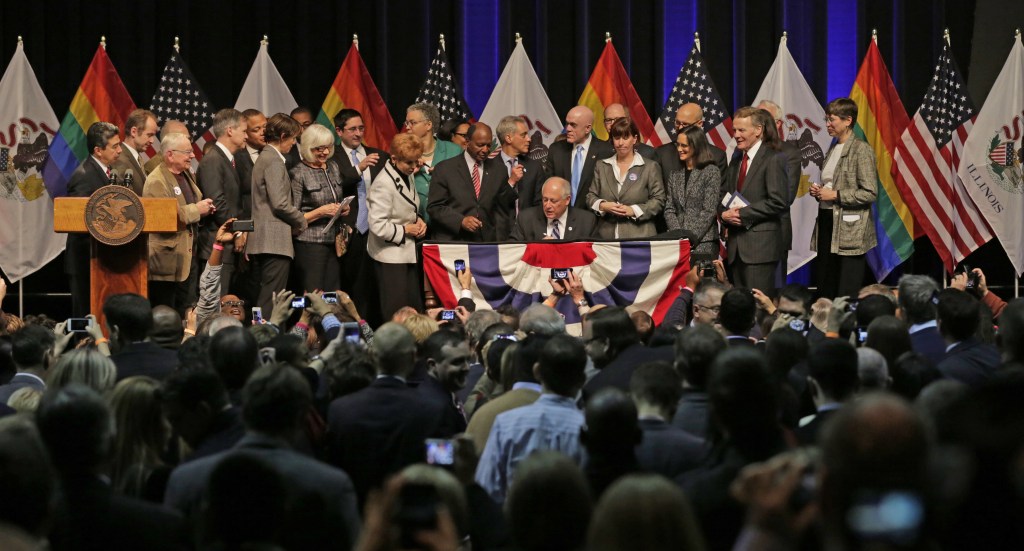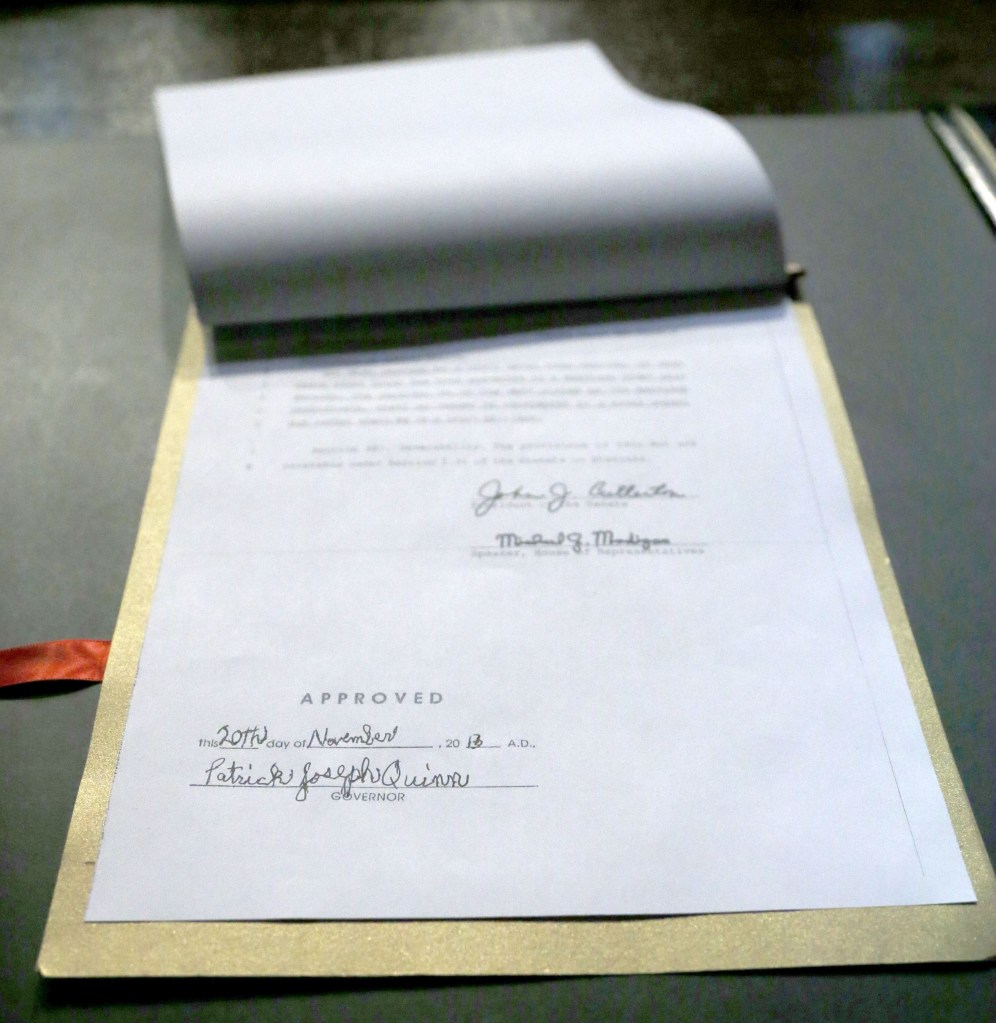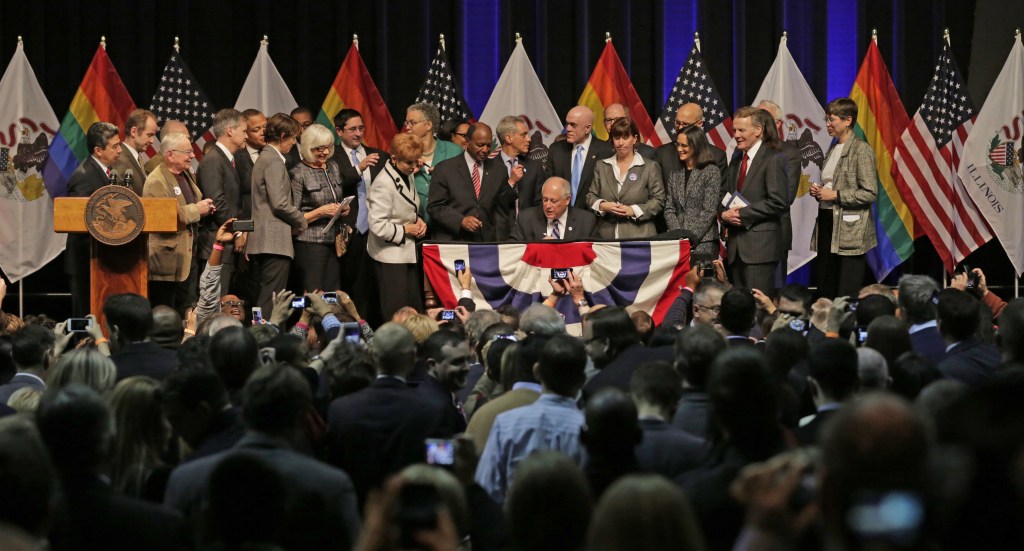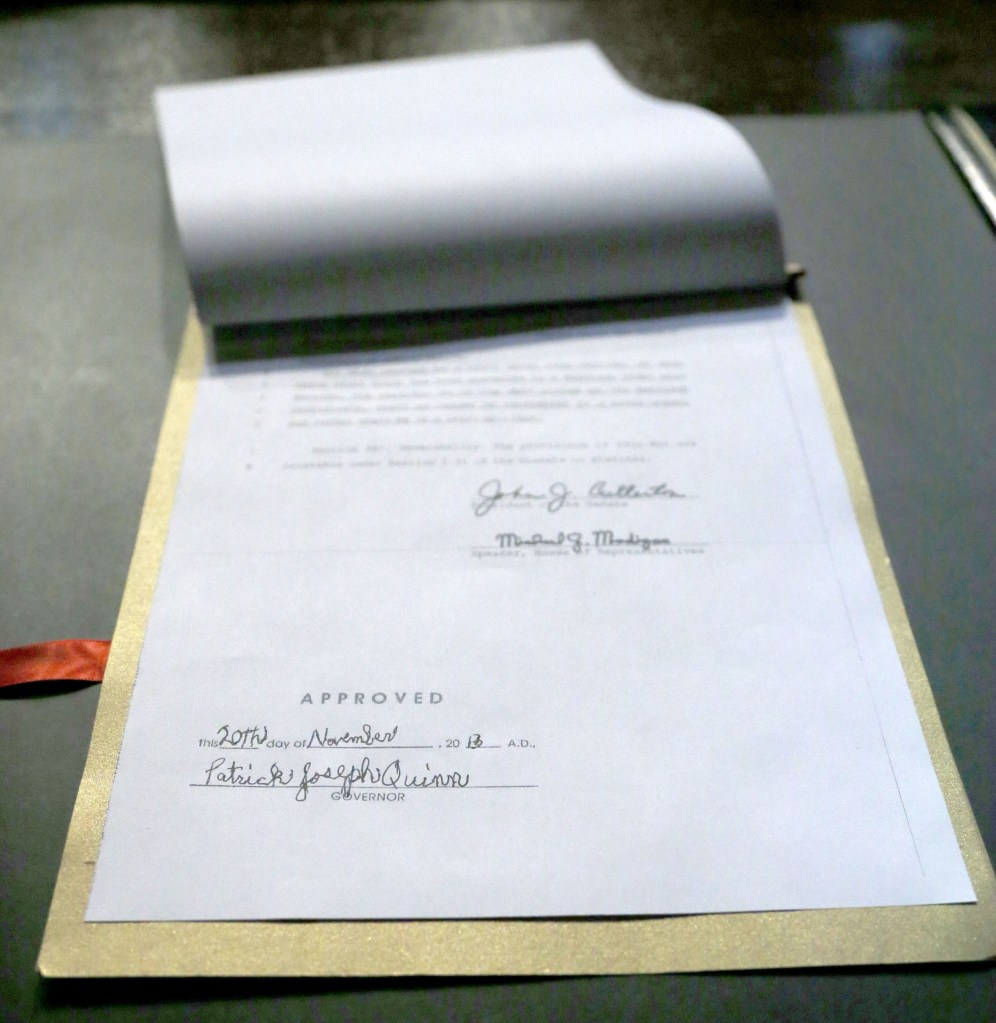CHICAGO — Illinois Gov. Pat Quinn signed legislation Wednesday allowing same-sex weddings starting this summer, making President Barack Obama’s home state the 16th overall — and largest in the nation’s heartland — to legalize gay marriage.
The atmosphere was festive at the University of Illinois at Chicago with a family-friendly crowd, musical performances and a stage lined with American, Illinois and rainbow flags.
“We understand in our state that part of our unfinished business is to help other states in the United States of America achieve marriage equality,” Quinn said before he signed the bill on a desk once used by President Abraham Lincoln. He said part of that mission was to ensure that “love is not relegated to a second class status to any citizen in our country.”
The state’s top elected officials from Illinois Attorney General Lisa Madigan to Chicago Mayor Rahm Emanuel, along with scores of activists and members of the public, attended. Organizers estimated that more than 2,300 attended.
Illinois, where Democrats lead both legislative chambers and the governor’s office, legalized civil unions in 2011, but the road to same-sex marriage was bumpy.
When 2013 began advocates hoped Illinois would’ve been the 10th state, but watched as other states passed it. Gay marriage is allowed in Washington D.C., and 15 other states; Hawaii’s governor signed a measure last week.
Even with support from top business leaders, Emanuel, and even a few top Republicans, several lawmakers were resistant to the idea. That included even Democrats in more conservative downstate Illinois and some Chicago-area lawmakers.
“We’ve realized that to have a forward-looking state, you cannot have backward-looking laws that discriminate against good and talented people, regardless of their sexual orientation,” Emanuel said at Wednesday’s ceremony.
The measure was fought hard by some of the state’s most well-recognized religious figures, including Cardinal Francis George of the Archdiocese of Chicago and the Rev. James Meeks, a former state senator who runs a politically-influential mega church in Chicago.
Meeks was part of a coalition of black pastors who said marriage should remain between a man and woman and sponsored robocalls in several legislative districts and on the airwaves. The opposition placed black lawmakers in the House in a spotlight and several evaded public inquiries on the matter for months.
But proponents launched an equally aggressive campaign with help from unions, the former head of the Illinois Republican Party and the ACLU. They billed the measure as a matter of civil rights and equality for families.
The measure passed the Illinois House earlier this month by a narrow margin 61-54; It needed 60 votes to pass.
But none of that evident Wednesday at the event where the Chicago Gay Men’s Chorus performed.
Comptroller Judy Baar Topinka, a Republican, praised the three House GOP members who voted in favor of the measure.
“History will show that we got it right on this one,” she said before telling the crowd, “I am available to be a flower girl, and I’ll even waive the fee.”
Although Illinois once appeared poised to become the first Midwestern state to approve gay marriage in the Legislature, Minnesota did it sooner and started holding its first same-sex weddings over the summer. Iowa allows gay marriages too because of a court ruling, not a legislative vote.
When the law takes effect June 1, same-sex couples can begin applying for marriage licenses. And Cook County —the state’s most populous — has even said it’ll be open for business that day even though it’s a Sunday.
There’s a small chance weddings could take place before then; Legislation is pending that could change the effective date to immediately. Lawmakers aren’t expected to gather for regular session until the end of January.
In the meantime, Illinois couples have already started planning.
Aimee Woolery from the Chicago suburb of Berwyn, has been with her partner for 15 years and attended the event with the couple’s two children.
“For us, it’s the family piece of it, they get some more security,” Woolery said, explaining that the couple decided against a civil union when Illinois legalized them in 2011. “We were holding out for marriage in Illinois.”
Her 9-year-old daughter, Graysen, said she is excited for her moms to wed.
“I want him to be the ring bearer,” she said pointing to her little brother. “And I want to be the flower girl.”
Send questions/comments to the editors.






Success. Please wait for the page to reload. If the page does not reload within 5 seconds, please refresh the page.
Enter your email and password to access comments.
Hi, to comment on stories you must . This profile is in addition to your subscription and website login.
Already have a commenting profile? .
Invalid username/password.
Please check your email to confirm and complete your registration.
Only subscribers are eligible to post comments. Please subscribe or login first for digital access. Here’s why.
Use the form below to reset your password. When you've submitted your account email, we will send an email with a reset code.